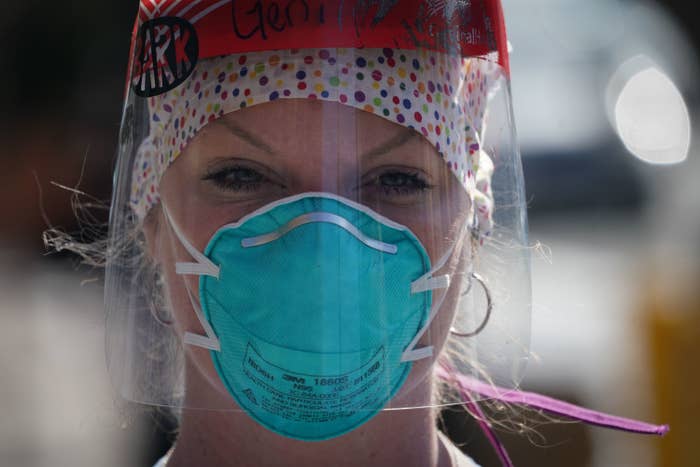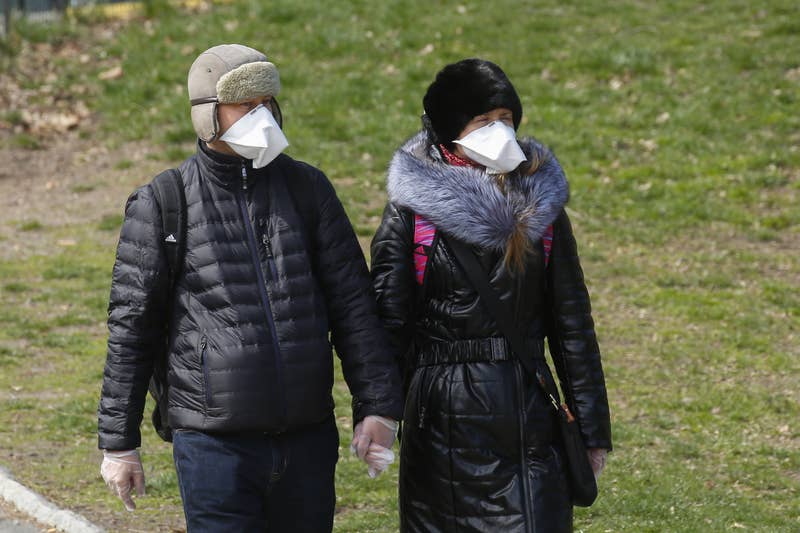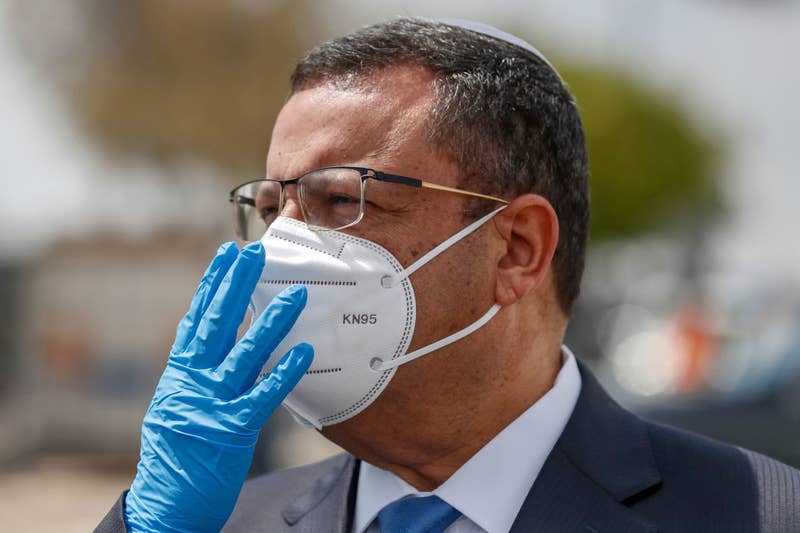Although the regulator recently authorized use of many kinds of foreign-certified respirators, it left the Chinese masks off the list.
Ken Bensinger BuzzFeed News Reporter April 2, 2020

Bryan R. Smith / Getty Images
A member of the medical staff listens as Montefiore Medical Center nurses call for N95 masks and other critical PPE to handle the coronavirus epidemic in New York, April 1.
In a move that could significantly ease national shortages of personal protective equipment, a top Food and Drug Administration official said Thursday that the agency will not block imports of KN95 respirator masks, a Chinese equivalent to the N95 masks needed by health care workers on the front lines of the coronavirus epidemic.
Until now, the legality of importing KN95 masks has been unclear. A little more than a week ago, the regulator authorized use of a variety of foreign-certified respirators as a substitute for scarce N95 masks on an emergency basis. That authorization came amid a growing public outcry over doctors and nurses forced to reuse respirators or even fashion masks from bandanas
But the FDA’s emergency authorization omitted the KN95 mask — despite the fact that the Centers for Disease Control and Prevention had previously included it on a list of “suitable alternatives” to the N95 mask.
That omission has sown considerable confusion among hospitals, health care workers, importers, and others who had considered turning to KN95 respirators when the market for N95 masks became overheated.
A BuzzFeed News story about the KN95 published earlier this week led to demands from members of the public, experts in the import business, and even a member of Congress that the FDA clear the path for KN95 masks. A KN95 petition launched early this week has to date gained more than 2,500 signatures.
“The FDA is not blocking KN95 mask importations,” said Anand Shah, the agency’s deputy commissioner for medical and scientific affairs in an interview.
But he added that even though the agency will allow importers to bring the equipment into the country, they would be doing so at their own risk. Unlike normally certified devices, or those authorized on an emergency basis, KN95 masks would have none of the legal protections or other support provided by the federal government.

Bryan R. Smith / Getty Images
A member of the medical staff listens as Montefiore Medical Center nurses call for N95 masks and other critical PPE to handle the coronavirus epidemic in New York, April 1.
In a move that could significantly ease national shortages of personal protective equipment, a top Food and Drug Administration official said Thursday that the agency will not block imports of KN95 respirator masks, a Chinese equivalent to the N95 masks needed by health care workers on the front lines of the coronavirus epidemic.
Until now, the legality of importing KN95 masks has been unclear. A little more than a week ago, the regulator authorized use of a variety of foreign-certified respirators as a substitute for scarce N95 masks on an emergency basis. That authorization came amid a growing public outcry over doctors and nurses forced to reuse respirators or even fashion masks from bandanas
But the FDA’s emergency authorization omitted the KN95 mask — despite the fact that the Centers for Disease Control and Prevention had previously included it on a list of “suitable alternatives” to the N95 mask.
That omission has sown considerable confusion among hospitals, health care workers, importers, and others who had considered turning to KN95 respirators when the market for N95 masks became overheated.
A BuzzFeed News story about the KN95 published earlier this week led to demands from members of the public, experts in the import business, and even a member of Congress that the FDA clear the path for KN95 masks. A KN95 petition launched early this week has to date gained more than 2,500 signatures.
“The FDA is not blocking KN95 mask importations,” said Anand Shah, the agency’s deputy commissioner for medical and scientific affairs in an interview.
But he added that even though the agency will allow importers to bring the equipment into the country, they would be doing so at their own risk. Unlike normally certified devices, or those authorized on an emergency basis, KN95 masks would have none of the legal protections or other support provided by the federal government.
The Chinese-certified KN95 mask is designed to similar standards as the N95 — which is certified by the National Institute for Occupational Safety and Health — yet is currently cheaper and far more abundant. Prices for N95s have, in some instances, risen to $12 or more per mask, while KN95 masks are available for less than $2, according to importers and manufacturers’ marketing materials.
While some hospitals and government entities have decided to accept donations of KN95 masks, many others have refused, citing a lack of clear guidance from the FDA, which regulates medical devices. And importers have worried that their shipments of masks could get tied up by US Customs at the border. Some of those importers said they remain concerned that without full federal authorization, they could be sued should someone fall ill after using one of the respirators.
“Our lawyer warned us we could get in trouble with these KN95s,” said Shawn Smith, a Santa Monica, California, entrepreneur who has been attempting to bring masks into the country to sell to hospitals. “He said we could get sued or even face criminal charges.”
As a result, Smith said, he’s had to join the fray of those trying to make deals to bring in N95 masks, an effort that he said has driven up prices sharply in the past few weeks.
Another would-be importer who emailed the FDA was told Tuesday that the agency “does not object to importation and use of these respirators during the emergency.”
But the FDA has not to date publicly explained the exclusion of KN95 masks from its emergency use authorization. In fact it has made no mention at all of the masks in any public forum. That left those considering purchases or donations of the protective equipment to make potentially costly decisions in an information vacuum, and fostered what amounts to a gray market for the much-needed masks — as well as considerable concern.
Shah said the FDA’s decision to omit the masks was not based on the quality of Chinese certification standards.

Kena Betancur / Getty Image
A couple wears face masks and surgical gloves as they walk in Central Park on March 22 in New York City.
“There are a number of countries that we feel are as vigorous as” US standards, said Shah, “and China is one of them.” Despite that, he said the agency chose not to include KN95 masks “due to the challenges of authenticating product imported from China,” noting that the agency has identified “inauthentic” products labeled as KN95 masks coming into the US. Shah declined to elaborate on what issues were found with those masks.
According to manufacturers, suppliers, and importers, as much as 80% of the world’s supply of all respirator masks of all types are manufactured in China, including US-certified N95 masks and those certified under European Union and other national standards. And multiple cases of counterfeit or nonfunctional masks labeled as N95 have been reported in recent weeks.
One hospital in Teaneck, New Jersey, last week said it had received 1,000 N95 masks from a trusted vendor and discovered they were fake. The CDC maintains an entire web page dedicated to phony N95 masks.

Ahmad Gharabli / Getty Images
Jerusalem Mayor Moshe Lion, wearing a KN95 mask, arrives at a drive-through testing location for COVID-19 in the Palestinian neighborhood of Jabal Mukaber in east Jerusalem, April 2.
Ken Bensinger is an investigative reporter for BuzzFeed News and is based in Los Angeles. He is the author of "Red Card," on the FIFA scandal. His DMs are open.
No comments:
Post a Comment